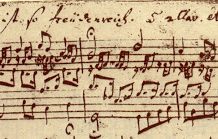When a confessor hears the same sins repeated over and over again, a thousand million times over, he may begin to wonder if there’s any hope left for the human race. I guess that’s where faith kicks in.
A couple of years ago I was deeply touched reading mystical conversations of Alicja Lenczewska (†2012) with Jesus, in the notes of in which everyone can find ways to avoid mortal sins and overcome venial ones.
Such an account might bring to mind, also from Poland, the great saint of Divine Mercy, Saint Faustina Kowalska. Similarly, Alicja is said to have been granted the gift of invisible stigmata, in which she felt the sufferings of Christ but without the bodily marks. Her religious retreat in Gostyń in 1985 yielded amazing series of graces: spiritual encounters and conversations; however some time afterwards she received the rare grace of mystical union with the Lord.
The contents of Alicja`s conversations were collected and printed as two separate books “Testimony” and “A Word of Instruction.” Bishop Henryk Wejman conferred the Imprimatur on both of them. Despite the fact that Alicja Lenczewska comes from a country which many Anglo-Celtic readers might see as off the beaten path, the very pages of this remarkable record of spiritual communication deserve special attention.
Once these journals were delivered to Catholic bookstores across Poland they were simply flying off the shelves. No wonder, since a staggering amount of words uttered by Jesus, as it is believed, not only appear to convey metaphysical power but also can find their counterparts in the abiding masterpieces of mystical literature.
On July 22, 1986 Alicja recorded “Offer up all your thoughts and feelings, acts, yourself. Keep on doing this, so that you have nothing left but Me. You will have everything in Me.”
Saint Faustina wrote down the spiritual advice from Jesus: “Daughter, give Me your misery, because it is your exclusive property.”
The instruction given on September 2, 1986 closely corresponds with the previews one. “Learn how to ask immediately for My help. Whenever your heart brings forth evil, offer it up to Me.” As the Scriptures indicate evil dwells in a human heart “For from the heart come evil thoughts, murder, adultery, unchastity, theft, false witness, blasphemy.” (Matthew 15:19)
As we can see below, the spiritual conundrum of gaining divine strength through human weakness, which is so much neglected and underestimated, seems have a common thread alluded to by great mystics. Jesus bestowed upon Alicja first the gift of understanding and then the privilege of experiencing it until her death. The dialogue of Our Lord with Alicja Lenczewska of April 27, 1986 illustrates this:
[Alicja]: A deep sense of helplessness overwhelms me, I even cannot desire as I should: sincerely and unceasingly. What must I do?
[Jesus]: Trust and ask. It is good that you feel helpless. Helplessness is the beginning of My power in yourself. I can only give My power to those who lose faith in their own capacity and strength. Only these can become strong through My power. Be helpless as a child.”
Compare this with the Doctor of the ‘Little Way’: “I am only a weak and helpless child, yet it is my very weakness which has made me daring enough to offer myself to You, Jesus, as the victim of Your love.” (St. Thérèse of Lisieux, The Story of a Soul)
And Jesus said to St. Paul Apostle: “My grace is sufficient for you, for power is made perfect in weakness.” I will rather boast most gladly of my weaknesses, in order that the power of Christ may dwell with me” (2 Corinthians 12:9)
On June 15, 1986, Jesus stressed the significance of humility: “The more humility you have the more graces you receive. If by a fall you can see truth about yourself then it is a blessing moment. Every man is sinful. Awareness of this truth must shape your relationship with Me and people. Remember the parable of the Pharisee and tax collector, and think it over. Your aim is not to be sinless, only you should be aware of your sinfulness.”
And, again, the Little Flower: “Nowadays I’m resigned to seeing myself in a permanent state of imperfection and I even delight in it.” (St. Thérèse of Lisieux, The Story of a Soul)
And the other Teresian Doctor, of Avila: “For as I said, humility is the foundation of the whole building and unless you are truly humble, our Lord for your own sake will never permit you to rear it very high lest it should fall to the ground.” (St. Teresa of Avila, The Interior Castle)
On July 23, 1986, our current Polish mystic wrote of the true value of weakness and the threat of rebellion against God.
[Alicja]: I’m sinful. What should I do in response to your call and love?
[Jesus]: Extremely simple. Devote and offer all your sinfulness and weakness to Me. Accept with peace filling your heart and love towards other people whatever comes your way. Don’t you know that everything comes from Me? When you rebel against the circumstances of your life you rebel against Me. Showing impatience, even in your heart, towards another – you show impatience with Me.”
Surprisingly, Jesus gives almost identical instructions through St. Faustina: “And Jesus said, For you, I am mercy itself; therefore I ask you to offer Me your misery and this very helplessness of yours, and in this way you will delight My Heart.” (Diary 1775)
And, now, to the mystic of the Ascent of Mount Carmel: “The soul should itself do nothing and desire nothing at the time, but conduct itself with resignation and humility, giving its free consent to God.” (St. John of the Cross, The Ascent of Mount Carmel)
When we begin to see ourselves as God sees us, we are then able to begin journey of transformation towards living in God’s truth. The dialogue held on July 29, 1986 merits our reflection.
[Alicja]: There is so much misery and stupidity in me. I am nothing compared to You, how can You bear it?
[Jesus]: Therefore, I love you. I know the abyss of your littleness and helplessness. I am utter perfection and need nothing added. I can only accept human powerlessness and misery to make it holy, and change into love, beauty and happiness. I desire only that.
Compare again the saint of Lisieux: “I feel no distress at seeing my complete helplessness. On the contrary, I glory in it and every day I expect to discover fresh flaws in myself. In fact, this revelation of my nothingness does me much more good than being enlightened on matters of faith. I remember that `charity covereth a multitude of sins`.” (St. Thérèse of Lisieux, The Story of a Soul)
And all the way back to the author of the Confessions: “You know how weak and stupid I am; teach me and heal me. Your only son in whom are hidden all treasures of wisdom and knowledge, has redeemed me with his blood.” (St. Augustine of Hippo, The Confessions)
In her notes, Lecznczewska continuously urges complete sincerity with God. On July 30, 1986 she heard – “Do not hide from Me to cover your sinfulness as Adam and Eve did in the garden. For I know everything and nothing will be concealed from Me. Do not think that you might amend it by yourself and come to Me cleansed. You cannot do anything, delaying will only aggravate the evil that has stuck to you. Evil creates evil. You must offer it immediately to Me, so that I can take it away before it grows. You must overcome shame, and in humility desire My help. […] True holiness begins when you abandon ambition and independence from Me.”
Saint Teresa of Avila: “If they [thoughts] come, as they do, from the misery, among many other miseries, inherited through the sin of Adam, let us be patient and endure them for the love of God since we are likewise subject to eating and sleeping without being able avoid it.”(St. Teresa of Avila, The Interior Castle)
And now to the convert, Carmelite and martyr, Edith Stein (Teresa Benedicta of he Cross): “And if the power fails us to endure the sight of human weakness in ourselves and in others, only a look at the Savior is again needed; indeed, He has not turned from our misery and took it upon Himself […] Thus he Himself has the remedy if we do not know where to find redress.” (St. Edith Stein, Essays on Woman: The Collected Works of Edith Stein)
God is not a genie who grants us whatever wish we desire, but instead responds in love to a child who asks for something, knowing exactly what we need. Alicja spontaneously learns how to surrender by dying to herself, in order to embrace the will of God.
On September 26, 1986 she wrote down in her notebook:
[Alicja]: Accept this day and my helplessness – do whatever you wish. Send me out anywhere.
[Jesus]: Stay with Me and offer up everything day after day, unceasingly. I will guide you and unfold where you should go and what you should do. Trust and remain faithful. Do not fear, nor think of your slender potential. I have every opportunity [to do so], therefore you don’t have to preoccupy yourself. If I give you work, I will also give you power and means to carry out. I only need your consent, desire to serve, and submission to My will.
Again, compare Saint Faustina: “My daughter, what you have said is true. You are very miserable, and it pleased Me to carry out this work of mercy precisely through you who are nothing but misery itself. Do not fear; I will not leave you alone. Do whatever you can in this matter; I will accomplish everything that is lacking in you. You know what is within your power to do; do that.” (St. Faustina, Diary 881)
And once more, the Little Flower: “Thérèse had disappeared like a drop of water lost in the depth of the ocean. Only Jesus remained—as Master and King. For had not Thérèse begged Him to take away her freedom? Freedom frightened her, for she knew herself to be so weak and feeble that she wished to be united with the divine Power for ever.” (St. Thérèse of Lisieux, The Story of a Soul)












